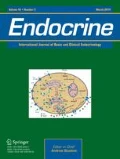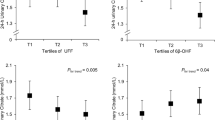Abstract
Low-grade metabolic acidosis (LGMA), as induced by high dietary acid load or sodium chloride (NaCl) intake, has been shown to increase bone and protein catabolism. Underlying mechanisms are not fully understood, but from clinical metabolic acidosis interactions of acid–base balance with glucocorticoid (GC) metabolism are known. We aimed to investigate GC activity/metabolism under alkaline supplementation and NaCl-induced LGMA. Eight young, healthy, normal-weight men participated in two crossover designed interventional studies. In Study A, two 10-day high NaCl diet (32 g/d) periods were conducted, one supplemented with 90 mmol KHCO3/day. In Study B, participants received a high and a low NaCl diet (31 vs. 3 g/day), each for 14 days. During low NaCl, the diet was moderately acidified by replacement of a bicarbonate-rich mineral water (consumed during high NaCl) with a non-alkalizing drinking water. In repeatedly collected 24-h urine samples, potentially bioactive-free GCs (urinary-free cortisol + free cortisone) were analyzed, as well as tetrahydrocortisol (THF), 5α-THF, and tetrahydrocortisone (THE). With supplementation of 90 mmol KHCO3, the marker of total adrenal GC secretion (THF + 5α-THF + THE) dropped (p = 0.047) and potentially bioactive-free GCs were reduced (p = 0.003). In Study B, however, GC secretion and potentially bioactive-free GCs did not exhibit the expected fall with NaCl-reduction as net acid excretion was raised by 30 mEq/d. Diet-induced acidification/alkalization affects GC activity and metabolism, which in case of long-term ingestion of habitually acidifying western diets may constitute an independent risk factor for bone degradation and cardiometabolic diseases.



Similar content being viewed by others
References
P. Frings-Meuthen, J. Buehlmeier, N. Baecker, P. Stehle, R. Fimmers, F. May, G. Kluge, M. Heer, High sodium chloride intake exacerbates immobilization-induced bone resorption and protein losses. J. Appl. Physiol. 111, 537–542 (2011)
E. Wynn, S.A. Lanham-New, M.A. Krieg, D.R. Whittamore, P. Burckhardt, Low estimates of dietary acid load are positively associated with bone ultrasound in women older than 75 years of age with a lifetime fracture. J. Nutr. 138, 1349–1354 (2008)
P. Frings-Meuthen, N. Baecker, M. Heer, Low-grade metabolic acidosis may be the cause of sodium chloride-induced exaggerated bone resorption. J. Bone Miner. Res. 23, 517–524 (2008)
U. Alexy, T. Remer, F. Manz, C.M. Neu, E. Schoenau, Long-term protein intake and dietary potential renal acid load are associated with bone modeling and remodeling at the proximal radius in healthy children. Am. J. Clin. Nutr. 82, 1107–1114 (2005)
H.M. Macdonald, S.A. New, W.D. Fraser, M.K. Campbell, D.M. Reid, Low dietary potassium intakes and high dietary estimates of net endogenous acid production are associated with low bone mineral density in premenopausal women and increased markers of bone resorption in postmenopausal women. Am. J. Clin. Nutr. 81, 923–933 (2005)
S. Berkemeyer, T. Remer, Anthropometrics provide a better estimate of urinary organic acid anion excretion than a dietary mineral intake-based estimate in children, adolescents, and young adults. J. Nutr. 136, 1203–1208 (2006)
T. Remer, F. Manz, Estimation of the renal net acid excretion by adults consuming diets containing variable amounts of protein. Am. J. Clin. Nutr. 59, 1356–1361 (1994)
M. Heer, P. Frings-Meuthen, J. Titze, M. Boschmann, S. Frisch, N. Baecker, L. Beck, Increasing sodium intake from a previous low or high intake affects water, electrolyte and acid-base balance differently. Br. J. Nutr. 101, 1286–1294 (2009)
L.A. Frassetto, R.C. Morris Jr, A. Sebastian, Dietary sodium chloride intake independently predicts the degree of hyperchloremic metabolic acidosis in healthy humans consuming a net acid-producing diet. Am. J. Physiol Renal Physiol. 293, F521–F525 (2007)
L.L. Hamm, P.M. Ambuhl, R.J. Alpern, Role of glucocorticoids in acidosis. Am. J. Kidney Dis. 34, 960–965 (1999)
T. Remer, K. Pietrzik, F. Manz, Short-term impact of a lactovegetarian diet on adrenocortical activity and adrenal androgens. J. Clin. Endocrinol. Metab. 83, 2132–2137 (1998)
M.F. McCarty, Acid-base balance may influence risk for insulin resistance syndrome by modulating cortisol output. Med. Hypotheses 64, 380–384 (2005)
M. Maurer, W. Riesen, J. Muser, H.N. Hulter, R. Krapf, Neutralization of western diet inhibits bone resorption independently of K intake and reduces cortisol secretion in humans. Am. J. Physiol Renal Physiol. 284, F32–F40 (2003)
L. Shi, A. Sanchez-Guijo, M.F. Hartmann, E. Schonau, J. Esche, S.A. Wudy, T. Remer, Higher glucocorticoid secretion in the physiological range is associated with lower bone strength at the proximal radius in healthy children: importance of protein intake adjustment. J. Bone Miner. Res. 30, 240–248 (2015)
D. Krupp, L. Shi, C. Maser-Gluth, M. Pietzarka, T. Remer, 11beta Hydroxysteroid dehydrogenase type 2 and dietary acid load are independently associated with blood pressure in healthy children and adolescents. Am. J. Clin. Nutr. 97, 612–620 (2013)
D. Krupp, L. Shi, T. Remer, Longitudinal relationships between diet-dependent renal acid load and blood pressure development in healthy children. Kidney Int. 85, 204–210 (2014)
K. Murakami, S. Sasaki, Y. Takahashi, K. Uenishi, Association between dietary acid-base load and cardiometabolic risk factors in young Japanese women. Br. J. Nutr. 100, 642–651 (2008)
J. Buehlmeier, P. Frings-Meuthen, T. Remer, C. Maser-Gluth, P. Stehle, G. Biolo, M. Heer, Alkaline salts to counteract bone resorption and protein wasting induced by high salt intake: results of a randomized controlled trial. J. Clin. Endocrinol. Metab. 97, 4789–4797 (2012)
A. Pavy-Le Traon, M. Heer, M.V. Narici, J. Rittweger, J. Vernikos, From space to earth: advances in human physiology from 20 years of bed rest studies (1986-2006). Eur. J. Appl. Physiol 101, 143–194 (2007)
L.A. Frassetto, S.A. Lanham-New, H.M. Macdonald, T. Remer, A. Sebastian, K.L. Tucker, F.A. Tylavsky, Standardizing terminology for estimating the diet-dependent net acid load to the metabolic system. J. Nutr. 137, 1491–1492 (2007)
C. Luthy, C. Moser, O. Oetliker, Acid-base determination of urine in 3 steps. Med. Lab (Stuttg) 30, 174–181 (1977)
T. Remer, G. Montenegro-Bethancourt, L. Shi, Long-term urine biobanking: storage stability of clinical chemical parameters under moderate freezing conditions without use of preservatives. Clin. Biochem. 47, 307–311 (2014)
P. Vecsei, B. Penke, R. Katzy, L. Baek, Radioimmunological determination of plasma cortisol. Experientia 28, 1104–1105 (1972)
T. Remer, C. Maser-Gluth, S.A. Wudy, Glucocorticoid measurements in health and disease–metabolic implications and the potential of 24-h urine analyses. Mini. Rev. Med. Chem. 8, 153–170 (2008)
P.M. Stewart, Z.S. Krozowski, 11 beta-hydroxysteroid dehydrogenase. Vitam. Horm. 57, 249–324 (1999)
S. Zhang, J. Paul, M. Nantha-Aree, N. Buckley, U. Shahzad, J. Cheng, J. DeBeer, M. Winemaker, D. Wismer, D. Punthakee, V. Avram, L. Thabane, Empirical comparison of four baseline covariate adjustment methods in analysis of continuous outcomes in randomized controlled trials. Clin. Epidemiol. 6, 227–235 (2014)
T. Remer, F. Manz, Potential renal acid load of foods and its influence on urine pH. J. Am. Diet. Assoc. 95, 791–797 (1995)
S.L. Gluck, Acid-base. Lancet 352, 474–479 (1998)
S. Berkemeyer, J. Vormann, A.L. Gunther, R. Rylander, L.A. Frassetto, T. Remer, Renal net acid excretion capacity is comparable in prepubescence, adolescence, and young adulthood but falls with aging. J. Am. Geriatr. Soc. 56, 1442–1448 (2008)
S. Lewicka, M. Nowicki, P. Vecsei, Effect of sodium restriction on urinary excretion of cortisol and its metabolites in humans. Steroids 63, 401–405 (1998)
G. Wambach, C. Bleienheuft, G. Bonner, Sodium loading raises urinary cortisol in man. J. Endocrinol. Invest. 9, 257–259 (1986)
P.J. Nolan, M.A. Knepper, R.K. Packer, Inhibition of IMCD 11 beta-hydroxysteroid dehydrogenase type 2 by low pH and acute acid loading. J. Am. Soc. Nephrol. 8, 530–534 (1997)
A. Thompson, M.A. Bailey, A.E. Michael, R.J. Unwin, Effects of changes in dietary intake of sodium and potassium and of metabolic acidosis on 11beta-hydroxysteroid dehydrogenase activities in rat kidney. Exp. Nephrol. 8, 44–51 (2000)
J. Murotsuki, R. Gagnon, X. Pu, K. Yang, Chronic hypoxemia selectively down-regulates 11beta-hydroxysteroid dehydrogenase type 2 gene expression in the fetal sheep kidney. Biol. Reprod. 58, 234–239 (1998)
J.J. Hermans, M.A. Fischer, P.M. Schiffers, H.A. Struijker-Boudier, High dietary potassium chloride intake augments rat renal mineralocorticoid receptor selectivity via 11beta-hydroxysteroid dehydrogenase. Biochim. Biophys. Acta 1472, 537–549 (1999)
N. Goraya, J. Simoni, C.H. Jo, D.E. Wesson, A comparison of treating metabolic acidosis in CKD stage 4 hypertensive kidney disease with fruits and vegetables or sodium bicarbonate. Clin. J. Am. Soc. Nephrol. 8, 371–381 (2013)
I.J. Brown, I. Tzoulaki, V. Candeias, P. Elliott, Salt intakes around the world: implications for public health. Int. J. Epidemiol. 38, 791–813 (2009)
M. Heer, A. Boerger, N. Kamps, C. Mika, C. Korr, C. Drummer, Nutrient supply during recent European missions. Pflugers Arch. 441, R8–14 (2000)
Joint WHO/FAO Expert Consultation on Diet, nutrition and the prevention of chronic diseases 916, 1–149 (2003)
F. Prodam, R. Ricotti, V. Agarla, S. Parlamento, G. Genoni, C. Balossini, G.E. Walker, G. Aimaretti, G. Bona, S. Bellone, High-end normal adrenocorticotropic hormone and cortisol levels are associated with specific cardiovascular risk factors in pediatric obesity: a cross-sectional study. BMC Med. 11, 44 (2013)
A.A. Ferrando, C.A. Stuart, M. Sheffield-Moore, R.R. Wolfe, Inactivity amplifies the catabolic response of skeletal muscle to cortisol. J. Clin. Endocrinol. Metab. 84, 3515–3521 (1999)
Acknowledgments
We thank the volunteers, who gave time and effort to ensure the success of the projects, the staff of the Institute of Aerospace Medicine for their collaboration in conducting the studies, and the staff of the Department of Pharmacology for excellent biochemical analysis.
Author information
Authors and Affiliations
Corresponding author
Ethics declarations
Conflict of interest
The authors declare that they have no conflict of interest.
Additional information
Judith Buehlmeier and Thomas Remer have contributed equally to this work.
Rights and permissions
About this article
Cite this article
Buehlmeier, J., Remer, T., Frings-Meuthen, P. et al. Glucocorticoid activity and metabolism with NaCl-induced low-grade metabolic acidosis and oral alkalization: results of two randomized controlled trials. Endocrine 52, 139–147 (2016). https://doi.org/10.1007/s12020-015-0730-7
Received:
Accepted:
Published:
Issue Date:
DOI: https://doi.org/10.1007/s12020-015-0730-7




